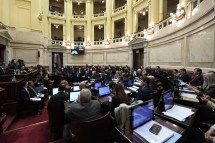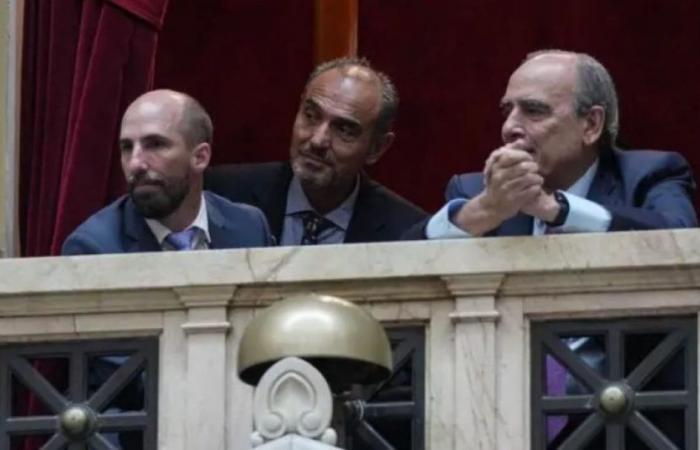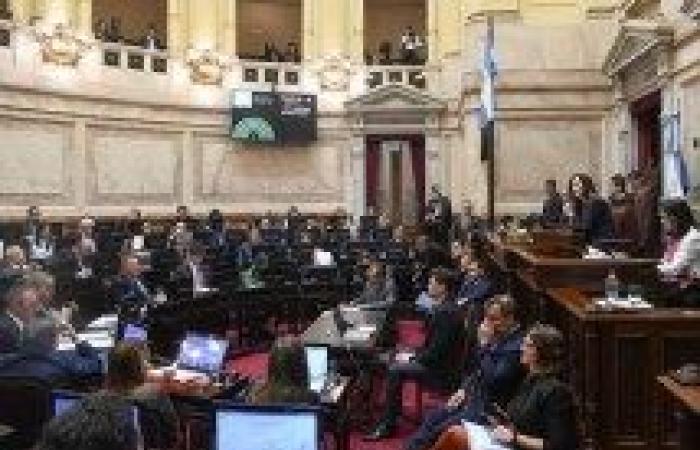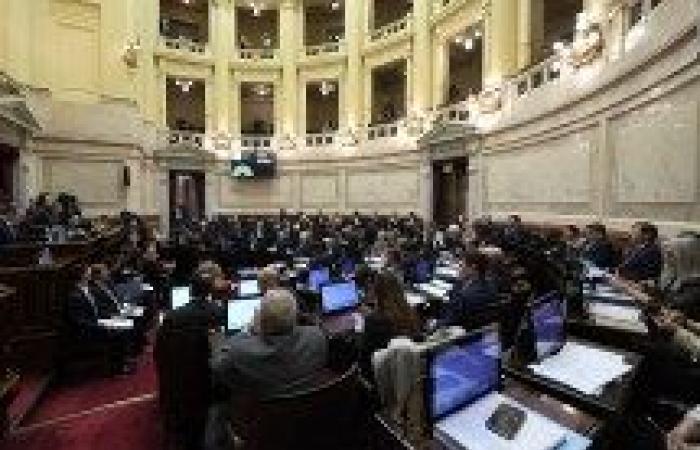The Chief of Staff, Guillermo Francos, today asked the deputies to respond to the government and the allied opposition that we insist on the sanction of the fiscal package as it was approved in the Chamber of Deputies.
A few hours after the session in the Senate, Francos went to Congress to begin diagramming the strategy to achieve approval of the points that were objected to. such as the increase in Income Tax and changes in Personal Assets.
The meeting was attended by: for the PRO, Cristian Ritondo, Silvia Lospenatto and Silvana Giudici; by La Libertad Avanza, Gabriel Bornoroni, Nicolás Mayoraz and Santiago Santurio and Eduardo Falcone; and for We Make the Federal Coalition, Juan Manuel López, Miguel Pichetto and Juan Brugge. In addition to Rodrigo de Loredo (UCR); Pamela Caletti (Federal Innovation); Carolina Píparo (Buenos Aires Libre); and Cecilia Ibáñez (MID).
Also present were the Deputy Chief of Staff, José Rolandi; and the Secretary of Regulatory Strategic Planning, María Ibarzábal Murphy.
The claim of the official deputies is to achieve the signing of the opinion on Tuesday, June 25, so that the session can be held on Thursday, June 27.
The chapters that were rejected by the senators and They aim to restore the Income Taxwhich faces a complex scenario, and Personal Assets, where the Government did not expect to lose.
Due to the three national holidays next week there will be no parliamentary activity andThe treatment in the Lower House will only begin on June 24. The projects must go through the committees again (they are those of Budget and Finance, General Legislation and Constitutional Affairs) and could be voted on in the chamber that same week.
“There were things left along the way that we are going to recover, such as Profits and Personal Assets,” Francos said this Thursday, while the Deputies began to crunch numbers and evaluate the strategy. The lower house is empowered to accept some changes and reject others, in a kind of “mosaic voting”.
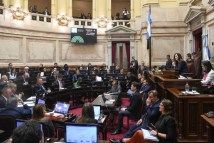
The return of Profits, objected to by the Patagonians in the Senate
Under pressure from the Patagonian senators, the Senate reversed the return of Ganancias with 41 votes against and 31 in favor. Governors Alberto Weretilneck and Ignacio Torres promoted the rejections of Mónica Silva from Rio Negro and Edith Terenzi and Andrea Cristina from Chubut, respectively.. José Carambia and Natalia Gadano from Santa Cruz, Edgardo Kueider from Entre Rios and Carlos Espínola from Corrientes, from Unidad Federal, joined. The radicals Martín Lousteau and Pablo Blanco, and 32 of the 33 members of Unión por la Patria, also voted against. The only support in the Peronist interbloc was that of Catamarca senator Guillermo Andrada, who follows orders from Governor Raúl Jalil.
In Deputies, the ruling party had achieved the return of Profits with 132 affirmative votes, 113 negative and 4 abstentions. But after the Senate’s rejection, the dialogue blocs do not see much political room to replace the tax, according to sources consulted by this medium. More than 900,000 workers would once again be covered by the tax. The role of the governors, eager for resources for their provincial coffers, will once again be the key.
The Government was resigned to losing the Earnings fight in the Senate, but I did not expect to be defeated in the Personal Assets chapter, which was rejected with 37 votes to 35. In this way, it was not accepted to raise the minimum taxable amount from $10 to $27 million, unify rates between goods in Argentina and abroad, nor the adjustment of the progressive scales of the tax, with rates that ranged from 0.5% to 1.5%. La Libertad Avanza will also work to insist on Deputies.
On the other hand, the Senate reversed with two-thirds of the votes (6 against 65) an article that the dialogue opposition had introduced in Deputies, 111, which urged the Executive Branch to send a bill, within a period of 60 days.to eliminate or modify expenses and tax exemptions of the State and thus increase collection by 2% of GDP. The article was rejected thanks to an agreement between the ruling party and the Fuegian radical Pablo Blanco, to which Unión por la Patria joined.

Behind this article was hidden an intention to end the industrial promotion regime of Tierra del Fuego. According to deputies from the UCR and Hacemos, in this way the State could raise enough to finance the recomposition of the 8% of pensions that has just been approved and the Government wants to veto. However, it will not be easy for dialogue legislators to support the article, because they would have to repeat the two-thirds majority obtained in the Senate.
In another order, the Upper House finally incorporated the article to raise the ceiling on mining royalties that provinces can charge companies. It received two-thirds (69 votes in favor and one abstention, from Alicia Kirchner). The increase was granted to Carambia and Gadano from Santa Cruz in exchange for the former signing the majority opinion in the commissions.
The Patagonians did not take everything they wanted: in the ruling they had achieved that the increase in royalties was from 3% to 5% for all investments, but the Government finally only granted the increase for new projects, while those already underway will remain at 3%.. Despite this, Carambia and Gadano left relieved: the victory by two-thirds allowed them to protect the article in the Deputies.
On the other hand, there are other issues that were excluded by decision of the Government, such as the elimination of the pension moratorium and its replacement with a “proportional retirement benefit”; and the privatization of Aerolíneas Argentinas, Correo Argentino and RTA (Argentine Radio and Television). Everything indicates that Deputies will accept these changes. However, Francos announced that they will return with privatizations in future laws.
